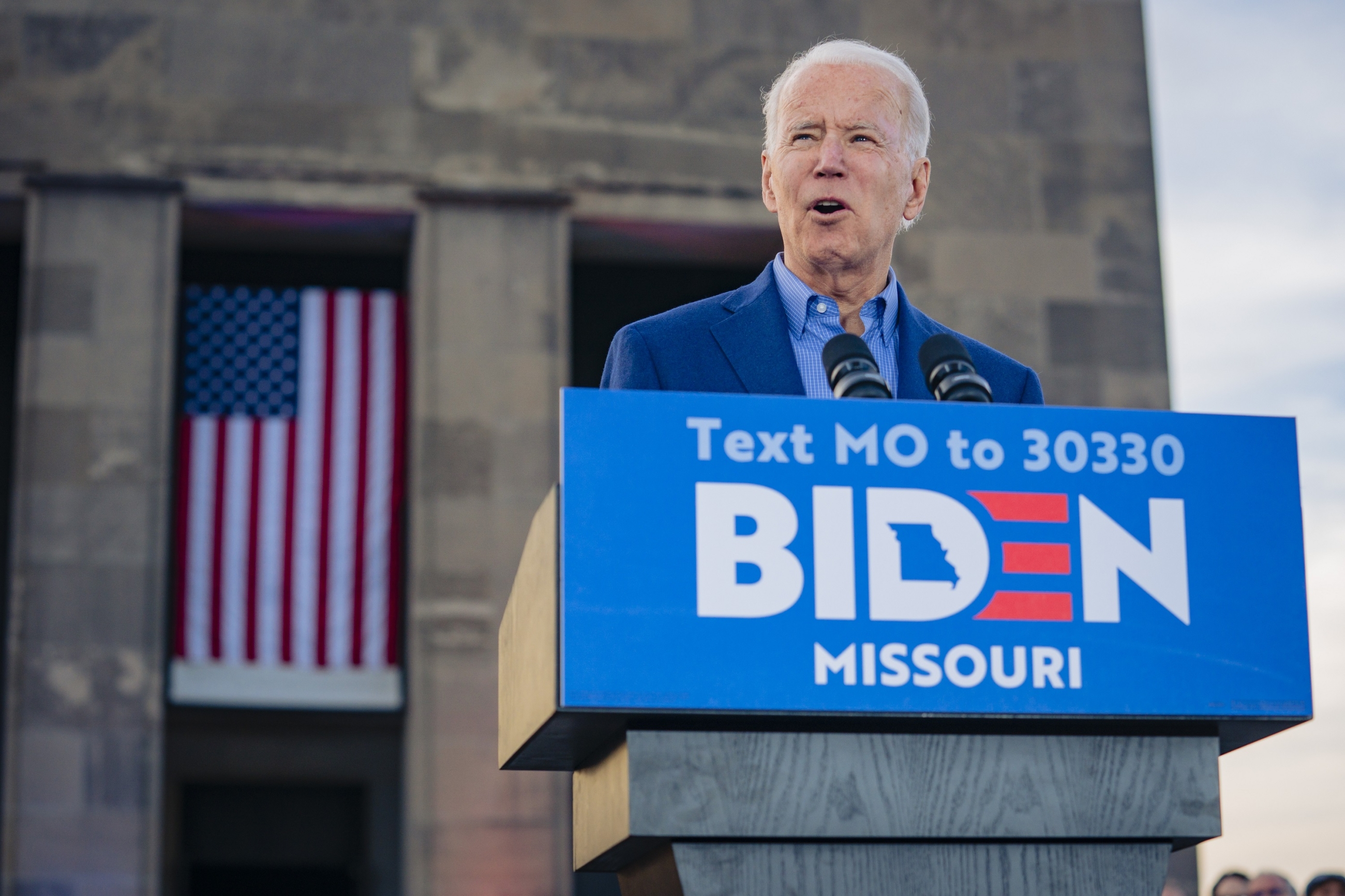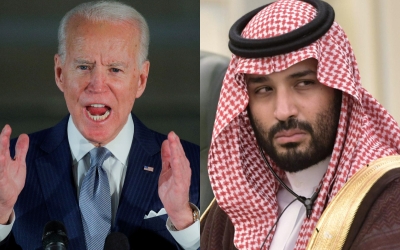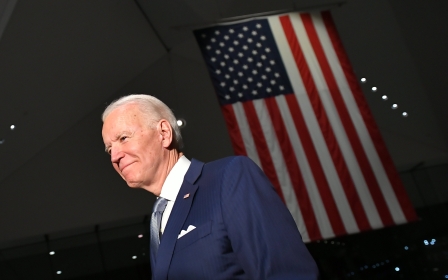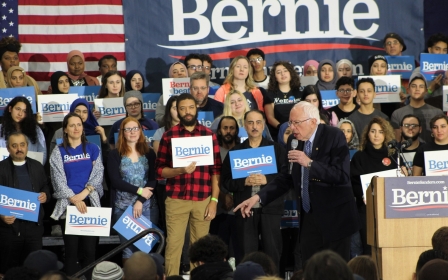Anti-war groups press Joe Biden: Leverage aid to Israel, end Yemen war

A group of civil rights and progressive organisations are urging presumptive Democratic nominee Joe Biden to adopt anti-war policies if elected president, including slashing the US military budget and leveraging aid to Israel.
In a letter signed by more than 50 organisations and released on Monday, the groups also called on the former vice president to end Washington's "unconstitutional participation in the Saudi-led war on Yemen".
"For decades, US foreign policy has been overly focused on confrontation with perceived adversaries and the global projection of US military power," the letter reads.
"Doing so has militarized our response to global challenges, distorted our national security spending priorities, toxified our political discourse, and left us woefully ill-prepared to confront the growing transnational threats to human security we face today that do not have military solutions."
'We need to readjust our priorities in the wake of Covid-19'
- Yasmine Taeb, Demand Progress
Signatories to the document, which was led by Demand Progress, include traditional anti-interventionist groups as well as progressive organisations and Palestine solidarity movements, including the Quincy Institute for Responsible Statecraft, Win Without War, IfNotNow and Jewish Voice for Peace.
Stay informed with MEE's newsletters
Sign up to get the latest alerts, insights and analysis, starting with Turkey Unpacked
The letter calls for closing down the Guantanamo Bay detention centre where dozens of "war on terror" prisoners remain in legal limbo without basic rights or due process.
Yasmine Taeb, senior policy counsel at Demand Progress, said the groups have not received a response from Biden's campaign.
She added that the letter "arose out of a need to pressure" Biden in the direction of prioritising restraint and diplomacy in foreign policy.
"The intent of this letter was to get that message across to the Biden campaign, and it arose out of a need to pressure Vice President Joe Biden in the direction of emphasising more restraint in foreign policy and prioritising the use of diplomacy," Taeb told MEE.
Leveraging aid to Israel
On the Israeli-Palestinian conflict, the groups urge Biden to use military aid as leverage to help end the occupation and lift the siege on Gaza.
"We call on you to use a combination of pressure and incentives, including leveraging the annual $3.8 billion in US military funding to Israel, to get all parties to come to an agreement that upholds UN Security Council Resolutions and international law," the groups say in their statement to Biden.
That includes "ending Israel’s military occupation; disbanding Israel’s illegal settlements in the West Bank and East Jerusalem; ending the Israeli military blockade of Gaza; and ending all attacks on civilians, be they Israeli or Palestinian."
The idea of conditioning military aid to Israel to pressure it to end its abuses against Palestinians had gained popularity during the Democratic primary, with Senator Bernie Sanders vowing to put US assistance to Israel on the table and even repurpose some of it to address the humanitarian crisis in Gaza.
But Biden has dismissed leveraging the aid, calling the proposal "bizarre".
On Sunday, Biden's campaign released a plan detailing his agenda for Muslim Americans, pledging to "continue to oppose Israeli settlement expansion" and annexation. Over the past five decades, the verbal opposition of successive administrations failed to stop Israel from building new settlements in defiance of international law.
Medea Benjamin, the co-founder of Code Pink, an anti-war feminist group that signed on to the letter, said it was "ridiculous" that Biden opposes conditioning aid to Israel, calling it a "basic position" that most people agree with.
"Biden's position is one that does not represent the American people, doesn't represent the best interests of this country or the Israelis or Palestinians, but represents the position of the right-wing in Israel," Benjamin told MEE.
US-Saudi relations
In the Muslim-American plan, the Biden campaign vows to advance human rights globally and says he would end the war in Yemen as well as "Donald Trump’s 'blank check' for Saudi Arabia’s human rights abuses at home and abroad".
The war in Yemen began in 2015 with the full support of the Obama administration, where Biden served as vice president when Riyadh started a bombing campaign against the Houthi rebels to restore the government of President Abd Rabbuh Mansour Hadi.
Since then, the already impoverished country has become the largest humanitarian crisis on the planet, according to the United Nations.
Benjamin does not see drastic changes in US-Saudi relations if Biden is elected, but she said she is hopeful that he would return to the Iran nuclear deal, which was signed under Barack Obama.
Two years ago, Trump abandoned the deal, formally known as the Joint Comprehensive Plan of Action (JCPOA), which saw Iran scale back its nuclear programme in exchange for lifting sanctions against its economy.
"The majority of Americans support finding diplomatic solutions to disputes with Iran. We call on you to end the ongoing failed 'maximum pressure' campaign, and return to the 'Iran Deal' (JCPOA) in exchange for Iran returning to full compliance with the accord, and seek to build on the deal with further negotiations," the anti-war groups wrote on Monday.
"After returning to the deal, we encourage you to pursue follow-on negotiations with Iran, Saudi Arabia, and other regional actors aimed at resolving conflicts across the region."
The letter also urged Biden to seek congressional approval before taking military action and to repeal the 2001 Authorization for Use of Military Force (AUMF), which gave then-President George W Bush and his successors broad powers to engage in military hostilities after the 9/11 attacks.
Wariness of war
The document, which calls for cutting the approximately $720bn US military budget by $200bn, comes at a time of increased scepticism toward war and foreign interventions across the US political spectrum.
Last year, Congress passed a resolution to end US assistance for the Saudi-led coalition in Yemen. And earlier in 2020, legislators approved a measure that would require Trump to seek congressional authorisation before engaging in hostilities against Iran.
Both bills received bipartisan support but were vetoed by Trump, who still portrays himself as an opponent of "endless wars".
Benjamin said it was disappointing that Biden - rather than a more progressive candidate - secured the Democratic nomination, but she acknowledged that activists would have a better chance influencing a Democratic president than Trump.
"Trump has put us on the brink of war with Iran when we were on the way to having improved relations... The way he's embraced the Saudis has been so disgusting," Benjamin told MEE.
"What he has done with giving Israel the green light to do whatever it wants is a constant war against the Palestinians. And then you have to add to that the economic warfare against Venezuela, Iran, Cuba, North Korea - this has been killing people every single day."
She added that the spread of the coronavirus will further open people's eyes in opposition to wars and wasteful military spending. "When asked about what are the biggest threats, they will certainly not put individual countries at the top of their list. They will put other issues like pandemics and the climate crisis."
For her part, Taeb, of Demand Justice, said while Washington spends more than $700bn on the military annually, "we did not prepare at all" for the Covid-19 pandemic.
"We need to readjust our priorities in the wake of Covid-19 and focus more attention at home and on social spending and healthcare," she said.
Middle East Eye delivers independent and unrivalled coverage and analysis of the Middle East, North Africa and beyond. To learn more about republishing this content and the associated fees, please fill out this form. More about MEE can be found here.






